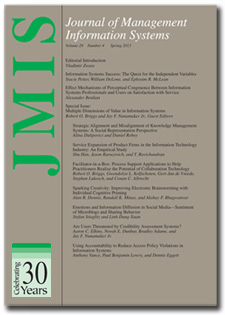在智能家居环境中接近IT安全和避免威胁
IF 6.2
2区 管理学
Q1 COMPUTER SCIENCE, INFORMATION SYSTEMS
引用次数: 1
摘要
不保护智能家居设备已被证明是对网络空间的威胁。这凸显了利用恐惧诉求来促进用户信息安全行为的重要性。我们实践情境化理论来加强恐惧诉求理论和设计。特别是,我们扩展了保护动机理论,以包括回避型动机(即用户避免使用其设备的意图),希望的积极情绪和信息技术(IT)-自我扩展。我们的假设包括恐惧产生保护动机和逃避动机,希望中介应对评估产生(减少)保护动机(逃避动机),信息技术自我扩展作为前项。我们进行了四项研究,包括两项调查和两项实验,并验证了我们的扩展。我们的主要理论贡献包括表明希望在决定哪种应对机制发生方面至关重要,并且它提高了理论的预测能力。在实践中,我们证明了带有自我延伸成分和强应对成分的恐惧呼吁信息更有效。本文章由计算机程序翻译,如有差异,请以英文原文为准。
Approaching IT Security & Avoiding Threats in the Smart Home Context
ABSTRACT Not securing smart home devices has proven a threat to cyberspace. This has underscored the importance of using fear appeals to promote users’ information security behavior. We practiced context-specific theorization to enhance fear appeal theory and design. Particularly, we extended Protection Motivation Theory to include avoidant-focused motivation (i.e., users’ intent to avoid using their devices), the positive emotion of hope, and information technology (IT)-self extension. Our hypotheses include that fear engenders both protection and avoidant-focused motivations, hope mediates coping appraisal to engender (reduce) protection (avoidant-focused) motivation, and IT-self-extension acts as an antecedent. We conducted four studies, including two surveys and two experiments, and validated our extensions. Our main theoretical contributions include showing that hope is critical in determining which coping mechanism occurs and that it improves the theory’s predictive power. In terms of practice, we demonstrate that a fear appeal message with a self-extension component and a strong coping component is more effective.
求助全文
通过发布文献求助,成功后即可免费获取论文全文。
去求助
来源期刊

Journal of Management Information Systems
工程技术-计算机:信息系统
CiteScore
10.20
自引率
13.00%
发文量
34
审稿时长
6 months
期刊介绍:
Journal of Management Information Systems is a widely recognized forum for the presentation of research that advances the practice and understanding of organizational information systems. It serves those investigating new modes of information delivery and the changing landscape of information policy making, as well as practitioners and executives managing the information resource.
 求助内容:
求助内容: 应助结果提醒方式:
应助结果提醒方式:


